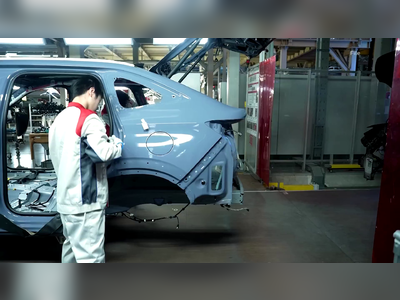The Impact of Artificial Intelligence on the Job Market: Projections and Concerns
A comprehensive look at anticipated job displacement due to advancements in artificial intelligence, with a focus on the U.S. labor market and global trends.
The labor market is on the precipice of significant changes due to advancements in artificial intelligence (AI), as various industry sources indicate.
Companies are actively investigating the potential for AI to replace human workers by achieving levels of efficiency comparable to that of humans.
Recent projections suggest that unemployment in the United States could rise to 20 percent as a result of automation, up from the current rate of 4.2 percent.
The CEO of Anthropic, a developer of AI models, noted that while current AI applications largely assist with tasks, a shift towards full automation of jobs is already underway.
Dario Amodei, the CEO of Anthropic, highlighted that many workers are unaware of the impending changes, which may seem unbelievable to them.
Insights from leaders in major companies reveal that extensive discussions are ongoing regarding the timeline for AI technologies to supersede human roles.
A recent global survey among managers of large corporations indicates that while the potential job losses from AI might not be as severe as previously feared, estimates suggest that AI could eliminate about 10 percent of all jobs within the next five years.
This outlook places particular concern on sectors already experiencing increasing AI pressures.
In the tech sector, restructurings are observed where teams are being organized around AI tools, favoring experienced developers capable of overseeing machine-generated code over younger employees who previously gained experience in manual coding.
Mark Zuckerberg of Meta has forecasted that mid-level engineers and potentially younger programmers seeking such positions might find themselves surplus to requirements as soon as this year.
Sam Altman, the CEO of OpenAI, remarked that AI agents are currently akin to apprentices but predicts that within the next year, they will be able to solve complex business challenges and generate new insights, thereby achieving the capabilities of seasoned engineers.
Furthermore, data from Eurostat indicates that Croatia ranks in the middle tier of European Union countries regarding the adoption of AI in businesses, with 11.8 percent of Croatian companies utilizing some form of AI in 2024, marking a 3.9 percent increase from the previous year.
Additionally, the proportion of Croatian citizens with a high level of AI literacy rose by 5 percent over the last year, reaching 24 percent.
This data stems from a national research project on perceptions of artificial intelligence conducted by the University of Effectus in conjunction with Croatian Post and the Kufner Group, encompassing a sample size of 2,200 respondents through both computer-assisted personal interviewing and online panel methodologies.
Companies are actively investigating the potential for AI to replace human workers by achieving levels of efficiency comparable to that of humans.
Recent projections suggest that unemployment in the United States could rise to 20 percent as a result of automation, up from the current rate of 4.2 percent.
The CEO of Anthropic, a developer of AI models, noted that while current AI applications largely assist with tasks, a shift towards full automation of jobs is already underway.
Dario Amodei, the CEO of Anthropic, highlighted that many workers are unaware of the impending changes, which may seem unbelievable to them.
Insights from leaders in major companies reveal that extensive discussions are ongoing regarding the timeline for AI technologies to supersede human roles.
A recent global survey among managers of large corporations indicates that while the potential job losses from AI might not be as severe as previously feared, estimates suggest that AI could eliminate about 10 percent of all jobs within the next five years.
This outlook places particular concern on sectors already experiencing increasing AI pressures.
In the tech sector, restructurings are observed where teams are being organized around AI tools, favoring experienced developers capable of overseeing machine-generated code over younger employees who previously gained experience in manual coding.
Mark Zuckerberg of Meta has forecasted that mid-level engineers and potentially younger programmers seeking such positions might find themselves surplus to requirements as soon as this year.
Sam Altman, the CEO of OpenAI, remarked that AI agents are currently akin to apprentices but predicts that within the next year, they will be able to solve complex business challenges and generate new insights, thereby achieving the capabilities of seasoned engineers.
Furthermore, data from Eurostat indicates that Croatia ranks in the middle tier of European Union countries regarding the adoption of AI in businesses, with 11.8 percent of Croatian companies utilizing some form of AI in 2024, marking a 3.9 percent increase from the previous year.
Additionally, the proportion of Croatian citizens with a high level of AI literacy rose by 5 percent over the last year, reaching 24 percent.
This data stems from a national research project on perceptions of artificial intelligence conducted by the University of Effectus in conjunction with Croatian Post and the Kufner Group, encompassing a sample size of 2,200 respondents through both computer-assisted personal interviewing and online panel methodologies.
AI Disclaimer: An advanced artificial intelligence (AI) system generated the content of this page on its own. This innovative technology conducts extensive research from a variety of reliable sources, performs rigorous fact-checking and verification, cleans up and balances biased or manipulated content, and presents a minimal factual summary that is just enough yet essential for you to function as an informed and educated citizen. Please keep in mind, however, that this system is an evolving technology, and as a result, the article may contain accidental inaccuracies or errors. We urge you to help us improve our site by reporting any inaccuracies you find using the "Contact Us" link at the bottom of this page. Your helpful feedback helps us improve our system and deliver more precise content. When you find an article of interest here, please look for the full and extensive coverage of this topic in traditional news sources, as they are written by professional journalists that we try to support, not replace. We appreciate your understanding and assistance.










